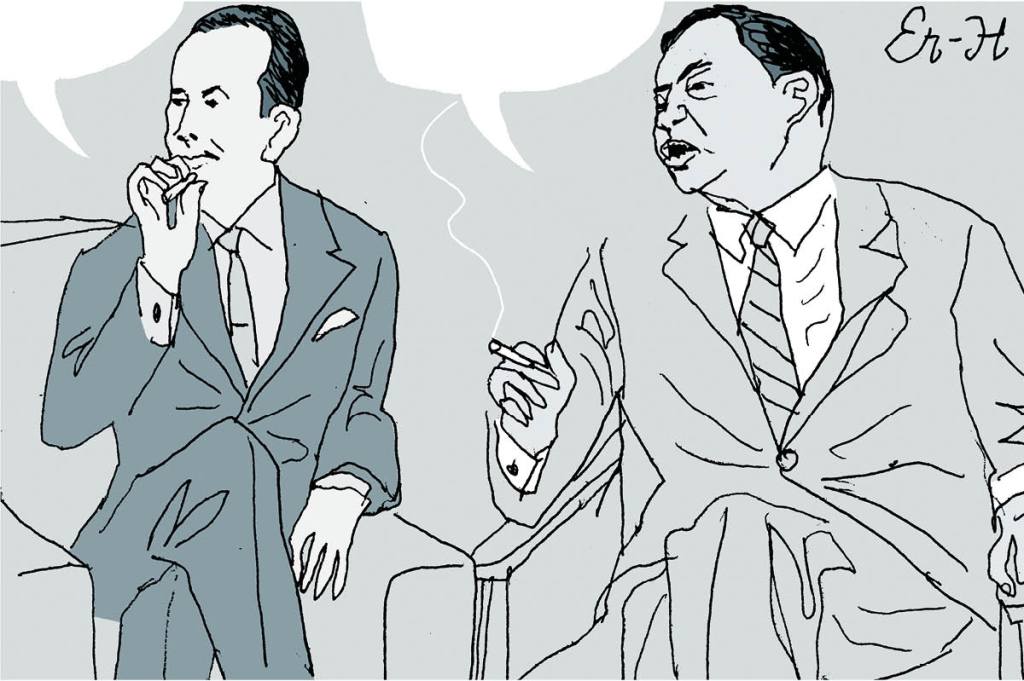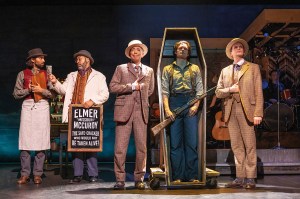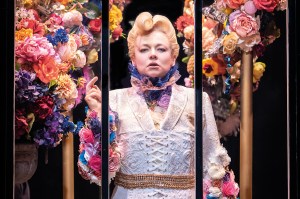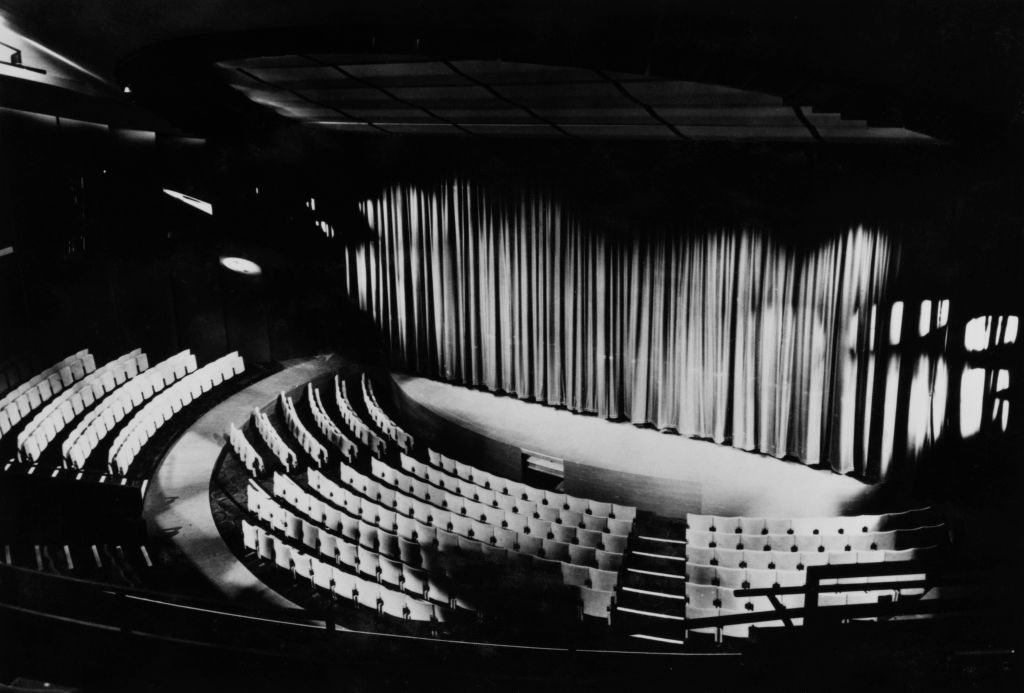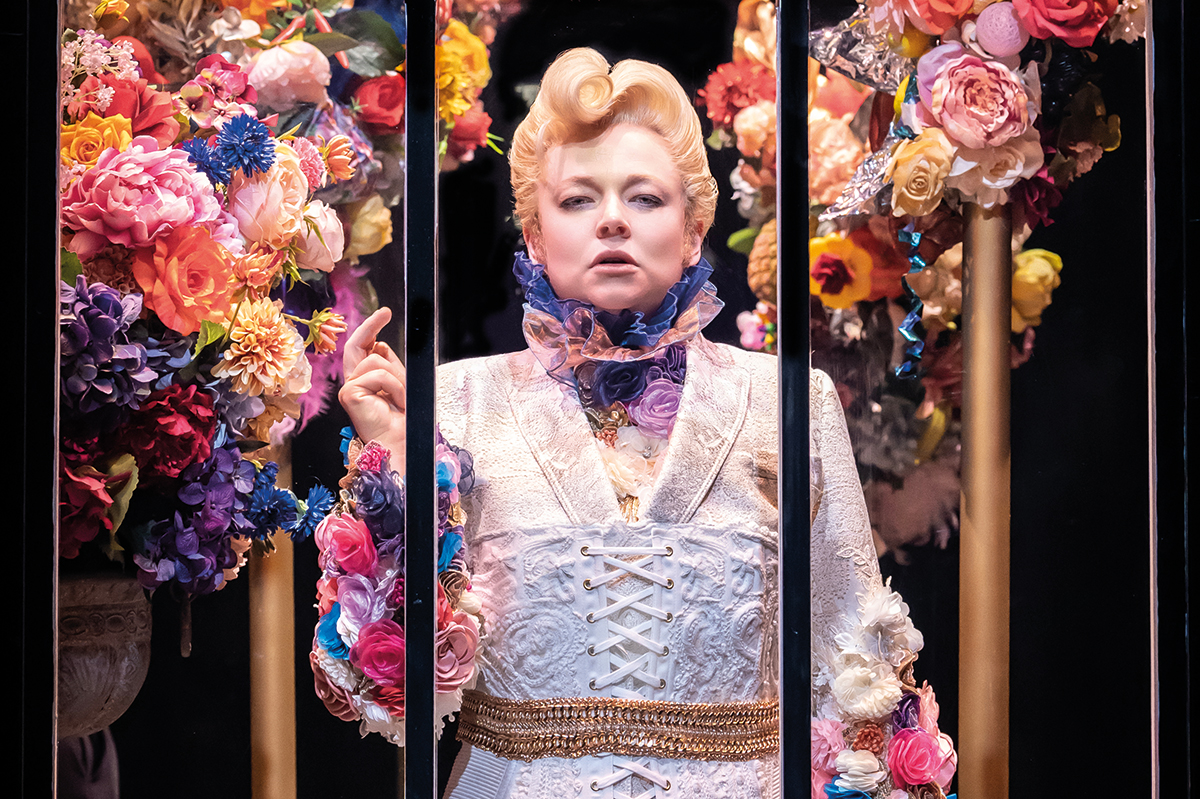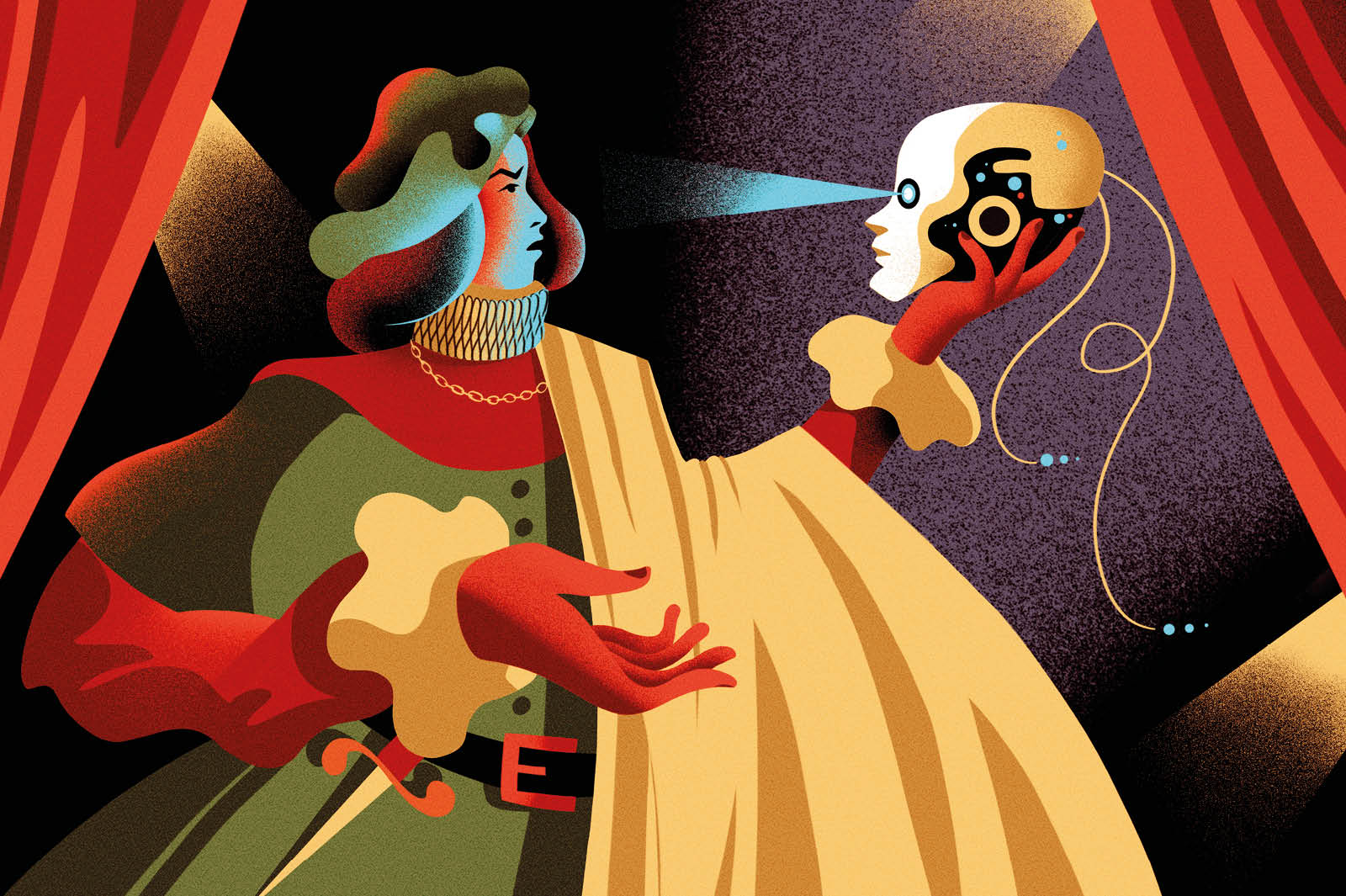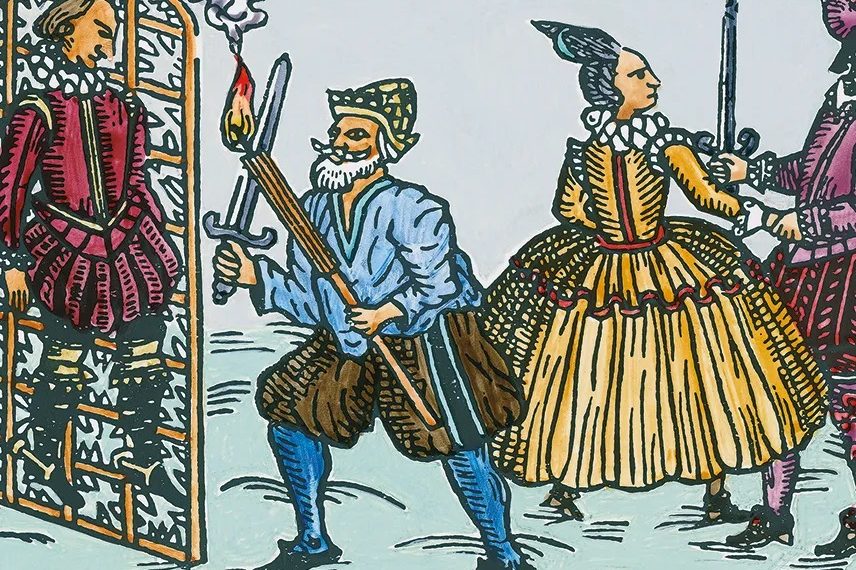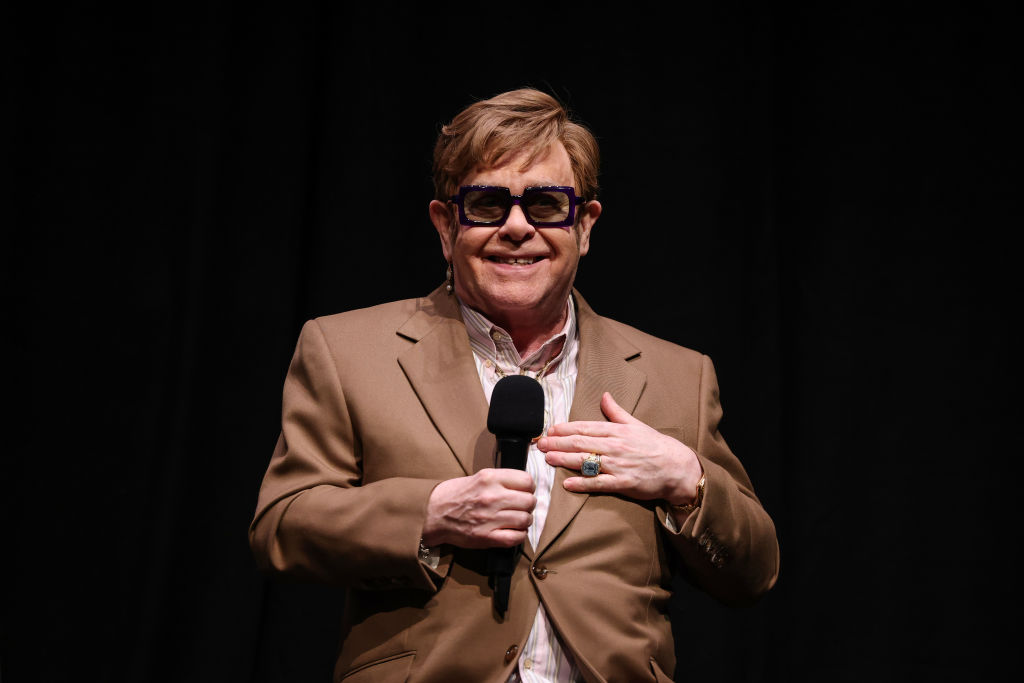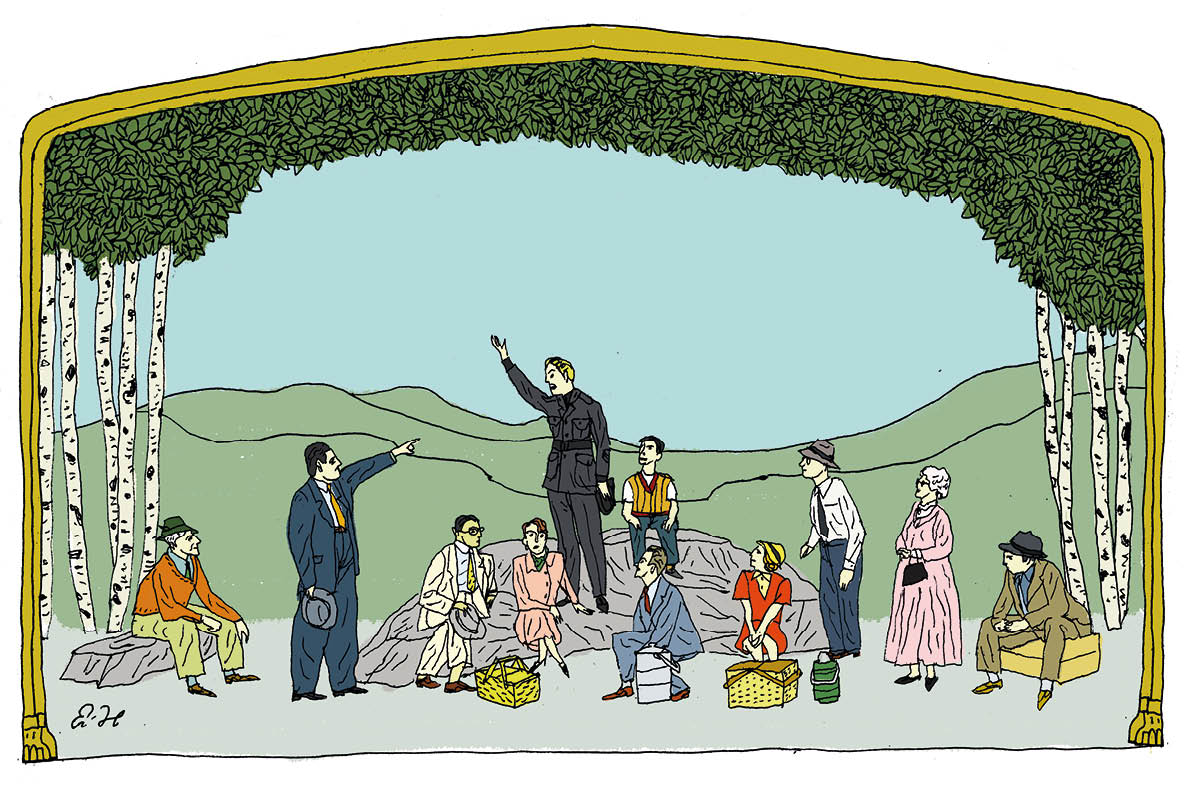Mental illness is horrifying and hilarious, like politics or killer clowns. And unlike those two subjects, it can be staged without tackiness or gimmicks. King Lear’s all the more tragic for losing his marbles and out-fooling the Fool.
I was nevertheless surprised to see a show exploit the premise as heartily as Good Night, Oscar does, for laughs and gasps alike. The new play about the mid-century pianist, actor, comedian, and all-around firecracker Oscar Levant gets more mileage out of old-school “mental-health struggles” — alcoholism, drug addiction, schizophrenia, OCD, wifebeating, electroshock therapy — in a taut hundred minutes than Dr. Phil could in a whole season.
The premise: Levant is due to appear on The Tonight Show, hosted by Jack Paar and filming not in New York but LA for a week, to juice the 1958 ratings sweeps. He’s late. His wife June reveals to Jack, two hours before showtime, that she had Oscar committed to a mental hospital a month ago — but has arranged for a four-hour release, on the pretext of their daughter’s graduation. And of course he’ll be there, June and Jack both assure NBC president Bob Sarnoff, who’s already suspicious of the erratic Oscar. We get the feeling we’re in for something naughty.
There to reassure us is Jack, who admits that “everyone knows [Oscar]’s certifiable” yet defends his guest’s right to air it all out onstage, “to treat chit-chat with all the daring of a high-wire act.” Conveniently, that means Jack has to play along with Oscar’s schtick, maybe egg him on. Here’s an excerpt from his on-air introduction:
It’s true Oscar is unusual. Eccentric, even. A hypochondriac? Definitely; he’s got more pills in his medicine chest than Rexall’s does in its whole pharmacy. He’s taken cures for which there are no known diseases…
“So please welcome my favorite mental patient,” he concludes — “one of America’s true geniuses — Oscar Levant!”
Sarnoff isn’t on stage for this scene, but we can imagine him groaning in the wings. He’s already threatened to pull the plug and wheel in Xavier Cugat (“Xavier Cugat?!” cries Jack at one point). Awkward and frazzled in the early going, he can still sneer: “It’s television, not a goddamn freak show.” He’s more eloquent by the end:
This so-called humor of yours? It’s not funny; it’s cruel. Degrading women, insulting the “Jews.” The way you carve yourself up for public consumption… turning your psychoses into quips and your pain into punchlines. It’s unseemly. And when we laugh at it, we debase ourselves. It makes us less decent. Less kind.
It’s about as convincing a case for censorship as one could make.
Insofar as Good Night, Oscar may be a “freak show,” at least author Doug Wright makes sure we feel guilty about enjoying it as such. And as a showman, Sean Hayes delivers the goods: his Oscar is a blast from old Hollywood, a cross between Jimmy Stewart and Don Knotts. The script furnishes him punch line after punch line. “Water’s for fish. Gimme a Wild Turkey.” “That’s the thing about schizophrenia — it sure beats dining alone.” “Poor Liz [Taylor]. Always a bride, never a bridesmaid.” “If I got a choice between the Doc’s couch and Jack’s chair? Just like Al Capone at Sing-Sing, I say ‘Gimme the chair.’”
But Oscar’s mental illness serves as more than a circus act; it provides the basis for a good deal of psychodrama, punctuated by Death of a Salesman-style hallucination sequences. These illustrate Oscar’s past relationship with George Gershwin (a smart John Zdrojeski), a recording of whose Rhapsody in Blue made Oscar a fortune. More than two decades after Gershwin’s death, we learn, his ghost still haunts Oscar, who was at once out-classed and mesmerized by the composer’s achievement: “I may not have written it, but it fit my fingers like nothin’ I ever played.” He knows he’ll be asked to perform on The Tonight Show. It becomes a central dilemma, then, whether he’ll play his own music or trot out the old standard, the crowd favorite. I won’t spoil his decision, but the performance scene — Hayes is a classically trained pianist — is showstopping.
And as Death of a Salesman did for the white working class, Good Night, Oscar marks the end of an era for show business. A few eras, in fact: a time when classical music was still popular entertainment, when jazz was just beginning to take over; the golden age of Hollywood, where Levant scored a few comedic roles as his piano career wound down; and most immediately, the heyday of late-night talk shows.
“The Tonight Show,” Sarnoff explains, “is meant to go down like warm milk.” Survey the late-night scene today, and it’s clear this has come to pass, but not in the terms Sarnoff imagined. Mental health is much discussed on television, but generally in the most nominal, therapeutic terms — as a pity party or an airing of grievance. A prick of humor might let out some hot air.
Good Night, Oscar takes us back to a time when, for better or worse, both foibles and felonies were targets for humor. This marvelous show lets all its insecurities hang out. To quote the real-life Jack Paar, introducing Jayne Mansfield: And here they are.
In its own way, the new musical New York, New York is also a tribute: to the whole city as it lifted its gaze from the horrors of World War Two, and specifically to the musicians and performers that helped make the Big Apple the twentieth-century culture capital of the West.
These of course include Broadway actors, meaning that to portray the subject — closer to home than The Tonight Show, in spirit if not geography — with sustained cynicism is nigh impossible without sabotaging the action onstage. Stephen Sondheim only managed the feat in Merrily We Roll Along (1981) by taking his cautionary Broadway-writer-gone-wrong tale in reverse, beginning with the protagonist’s late-career implosion and building to the starry-eyed optimism of his college days. And even that show was a flop, only gaining critical acclaim in the following decades. No such risks are taken here.
The show is based on the gritty 1977 musical drama of the same name, directed by Martin Scorsese and starring Liza Minnelli (a jazz singer) and Robert De Niro (her suitor, a sax man). Audiences, perhaps fearing Taxi Driver: The Musical, were largely uninterested, and the film is now best remembered for the score by John Kander and the late Fred Ebb, especially the title song, now shorthand for “Sinatra.” The present production expands on that plot and score, with some new songs from Kander and the ubiquitous Lin-Manuel Miranda as well as a few numbers from the Kander and Ebb back catalogue thrown in.
The shortfalls of New York, New York are by and large predictable: the plot has been soaped and sprayed down; the portrayal of the post-war city, with gorgeous storybook scene design by Beowulf Boritt, is relentlessly rosy; the score, comprising roughly thirty numbers written over the course of a half-century, sometimes loses its sense of direction; and the whole production, stretching over two and a half hours with a book by David Thompson and Sharon Washington, could profitably have been shortened by at least thirty minutes. I’ve heard it argued that New York, New York is essentially fodder for tourists, and there’s some truth to the charge.
But I’ll also say this: New York, New York is so fulsome in its admiration for the city, so enthusiastic in dramatizing it in song, that it’s damn near impossible not to root for. Scorsese’s goal for the film, after all, was an homage to golden-age movie musicals; under the direction of Susan Stroman, the new picks up where the old left off. But today, the musical past it celebrates — which was fairly stylized, even sanitized, to begin with — is for all purposes a foreign country to younger audiences, New Yorkers or not.
As an introduction to that bygone world, the musical delights of New York, New York float above the meandering plot. The story does fine as an afterthought. For entertainment purposes, it’s a smashing musical revue. In this respect New York, New York succeeds exactly where the new Some Like It Hot, reviewed in these pages in February, fails. Both shows offer a vision of mid-century showbiz, but the latter loads the gender-bending plot with so much ideological baggage that the music becomes an afterthought — or a spoonful of sugar to get the medicine down.
Here, the strength of the performers breathes life into the story. Leading the troupe is Colton Ryan as pianist Jimmy Doyle: the smoldering, spitting image of Chet Baker, he’s a full-force hurricane in “I Love Music” and a low whisper in “A Quiet Thing.” As his paramour, the blossoming Broadway star Francine Evans, Anna Uzele is a powerhouse; she ensures the film’s most famous numbers, “But the World Goes ’Round” and “New York, New York,” get their due. Jimmy’s sidekick Tommy, a game Clyde Alves, plays the perfect set-up man, especially in his dance solo in “I Love Peaches,” choreographed on construction scaffolding. Side plots involving the black trumpeter Jesse Webb, the Cuban drummer Mateo Diaz, and the German violinist Alex Mann add range to the musical medley. The ensemble as well as the orchestra (under the direction of Alvin Hough) are uniformly excellent.
Is New York, New York groundbreaking, must-see theater? Thank goodness, it doesn’t try to be. It’s just the rare update that improves on the original, fifty years later. A fine idea to make a brand-new start of it.
This article was originally published in The Spectator’s July 2023 World edition.



